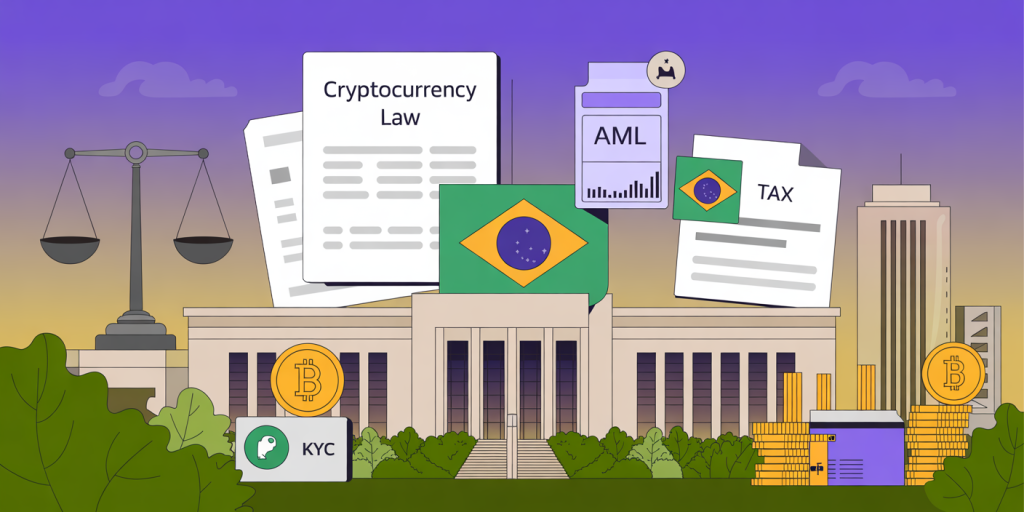Cryptocurrencies in Brazil: Is It Worth Investing in 2025?
Cryptocurrencies have transformed the global financial landscape over the past decade, becoming an intriguing asset class for investors. Brazil, as one of the largest emerging markets in Latin America, has increasingly embraced digital currencies, reflecting a significant shift in investment behavior and financial innovation. As 2025 approaches, understanding the dynamics of the cryptocurrency market within Brazil is crucial for investors who want to capitalize on this growing trend while managing inherent risks.

Brazil’s economic environment, regulatory framework, and technological infrastructure all influence the cryptocurrency scene. With rising adoption rates and a vibrant fintech ecosystem, the question remains: Is it genuinely worth investing in cryptocurrencies in Brazil in 2025? This article delves into Brazil’s crypto ecosystem, regulatory tendencies, market performance, and future outlook to deliver an informed perspective.
—
Current State of Cryptocurrency Adoption in Brazil
Brazil is rapidly becoming a prominent player in the Latin American cryptocurrency market. According to Statista, Brazil ranks among the top countries globally in terms of cryptocurrency adoption, with approximately 17% of the population owning or using digital currencies as of late 2023. This high adoption rate is primarily driven by the population’s pursuit of alternative financial solutions amid economic uncertainties, such as inflation and currency devaluation.
Anúncios
Several practical examples highlight this trend. Platforms like Mercado Bitcoin, Brazil’s largest crypto exchange, reported a 40% increase in new user registrations in 2023 compared to the previous year. Moreover, retail investors are increasingly engaging with decentralized finance (DeFi) apps and non-fungible tokens (NFTs), reflecting a diversification in the types of crypto investments. These factors demonstrate a healthy and growing interest in the sector, signaling potential opportunities for both novice and experienced investors.
One notable real case is the use of cryptocurrency for remittances. Many Brazilians living abroad use digital currencies to send money home faster and at lower costs compared to traditional methods. This practical utility has enhanced the appeal of crypto assets beyond purely speculative purposes.
—
Brazil’s Regulatory Environment and Its Impact on Crypto Investments
An essential factor influencing crypto investments is the regulatory framework within the country. Brazil has made significant strides to regulate and integrate cryptocurrencies into its financial system. By 2024, the Brazilian Central Bank and the Securities and Exchange Commission of Brazil (CVM) have implemented clearer guidelines about crypto exchanges, requiring mandatory registration and anti-money laundering (AML) compliance measures.
Anúncios

In 2023, Brazil enacted the “Cryptocurrency Law” which aims to promote transparency and security without stifling innovation. This regulatory approach is similar to frameworks observed in European countries like Germany and the United Kingdom, emphasizing consumer protection alongside industry growth.
However, the evolving regulation can also pose challenges. For instance, the Central Bank introduced stricter Know Your Customer (KYC) requirements, which some investors perceive as cumbersome. Additionally, tax obligations tied to crypto assets require stringent record-keeping, with the Brazilian Federal Revenue Service (Receita Federal) intensifying audits on undeclared crypto earnings.
The comparative regulatory landscape can be outlined in the table below:
| Country | Crypto Regulation Framework | User Protection | Taxation Policies | Regulatory Sentiment (2024) |
|---|---|---|---|---|
| Brazil | Registration for exchanges, AML/KYC | Moderate | Capital gains tax, mandatory reporting | Balanced, innovation-friendly |
| Germany | Licensing required for crypto businesses | High | Flat tax on crypto profits | Strict but clear |
| United Kingdom | FCA regulated crypto service providers | High | Capital gains tax, clear guidelines | Progressive and adaptive |
| United States | Mix of state and federal guidelines | Variable | Capital gains tax, complex rules | Fragmented but maturing |
Investors considering Brazil in 2025 should stay updated with policy developments to avoid unexpected compliance risks, particularly with taxation and anti-fraud mechanisms.
—
Market Performance and Investment Opportunities in 2025
The cryptocurrency market in Brazil has experienced significant volatility, reflecting broader global trends with Bitcoin (BTC), Ethereum (ETH), and emerging altcoins showing fluctuating prices. Brazilian investors benefit from relatively low entry barriers, with numerous exchanges offering localized interfaces, Brazilian Real (BRL) trading pairs, and instant bank transfers.

From a practical investment perspective, Brazil has shown promising interest in Bitcoin as a store of value during economic instability – similar to its role in countries like Argentina. In 2024, Bitcoin’s price demonstrated resilience through national inflation spikes, maintaining a position as a preferred asset among cautious investors.
Beyond Bitcoin, Brazil is witnessing growth in utility tokens connected to its burgeoning DeFi and NFT markets. For example, the platform “Aleph Zero,” a blockchain project originating in Brazil, gained attention for its scalable infrastructure and innovative consensus mechanism. Such projects are increasingly considered blue-chip investments domestically.
Table 2 highlights the performance of selected cryptocurrencies relevant to Brazil over the past 24 months (Jan 2023 to Dec 2024):
| Cryptocurrency | Price Jan 2023 (USD) | Price Dec 2024 (USD) | % Change | Relevance to Brazil |
|---|---|---|---|---|
| Bitcoin (BTC) | 16,500 | 34,000 | +106% | Store of value, mainstream adoption |
| Ethereum (ETH) | 1,200 | 2,600 | +116% | DeFi infrastructure, smart contracts |
| Aleph Zero (AZ) | 0.45 | 1.30 | +189% | Local blockchain innovation, growing utility |
| Cardano (ADA) | 0.35 | 0.52 | +49% | Popular for academic and governmental projects |
Given these trends, investing diversely in major coins and promising local projects could offer attractive returns for risk-tolerant investors in Brazil.
—
Risks and Challenges Facing Crypto Investors in Brazil
While the opportunities appear promising, Brazilian crypto investors must remain aware of substantial risks. Market volatility is the most obvious challenge; cryptocurrency prices are notoriously unpredictable, and Brazil’s market is not immune to global shocks. For instance, geopolitical tensions, global regulatory shifts, or technological failures can trigger rapid price corrections.
Another issue concerns security risks. Brazil saw a surge in crypto-related cybercrime cases during 2023, ranging from phishing attacks targeting users to exchange breaches. The decentralized and anonymous nature of cryptos presents unique challenges in recovering stolen assets compared to traditional bank fraud.
Economic challenges such as Brazil’s inflation and fluctuating exchange rates can also impact the value proposition of crypto assets compared to local investments. While cryptocurrencies may hedge against inflation, the Brazilian Real’s depreciation affects fiat-to-crypto conversions and liquidity management.
Lastly, the complexity of tax compliance remains a barrier for many individual investors, as failure to comply can lead to significant penalties imposed by Receita Federal. The necessity for keeping accurate records is often underestimated by newcomers, complicating their investment experience.
—
Comparing Cryptocurrencies with Traditional Brazilian Investments
For investors evaluating whether to invest in cryptocurrencies or more traditional assets such as government bonds, stocks, or real estate, understanding the pros and cons is vital.
| Investment Type | Expected Return | Risk Level | Liquidity | Regulatory Environment | Typical Investor Profile |
|---|---|---|---|---|---|
| Cryptocurrencies | High (variable) | High | High | Evolving, moderate to high | Risk-tolerant, tech-savvy |
| Brazilian Gov. Bonds | Moderate (5-7% annually) | Low | Moderate | Stable, well-regulated | Conservative, income-focused |
| Brazilian Stock Market | Moderate to high | Moderate | High | Well-regulated | Diverse, growth-focused |
| Real Estate (Brazil) | Moderate (4-6% rental) | Low to moderate | Low to moderate | Well-regulated | Long-term, wealth preservation |
Compared to traditional investments, cryptocurrencies carry both greater upside potential and higher risk. The market’s highly speculative nature means only a portion of one’s portfolio should be allocated to crypto to maintain risk balance.
—
Future Perspectives on Cryptocurrency in Brazil
Looking ahead to 2025 and beyond, Brazil’s cryptocurrency market is poised for continued expansion, fueled by demographic trends, increasing digital literacy, and ongoing fintech innovation. Younger generations, more comfortable with technology and skeptical of traditional financial institutions, are likely to drive adoption further.
On the regulatory front, Brazil has laid foundational laws but is expected to refine its framework to better balance investor protection with industry growth. Blockchain integration in public administration and financial services is anticipated to deepen, enhancing transparency and reducing costs.
Technological advancements such as the rise of Central Bank Digital Currencies (CBDCs) could complement cryptocurrencies, offering new avenues for hybrid financial ecosystems. Brazil’s Central Bank has been actively researching a digital real, which may interact with private cryptocurrencies and improve transaction efficiency.
The Bitcoin Future Index Forecast estimated that by 2027, Brazil could join the ranks of countries with over 30% crypto adoption, driven by infrastructure improvements and international capital inflows. For practical investors, staying informed about technological and regulatory changes will be essential to capitalizing on emerging opportunities
